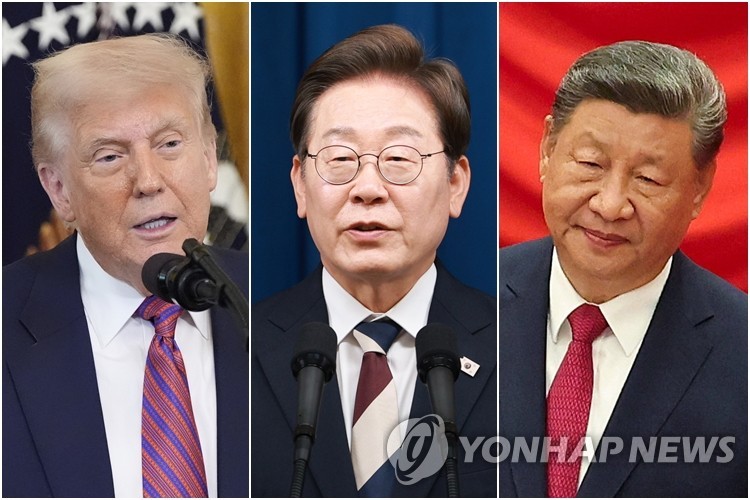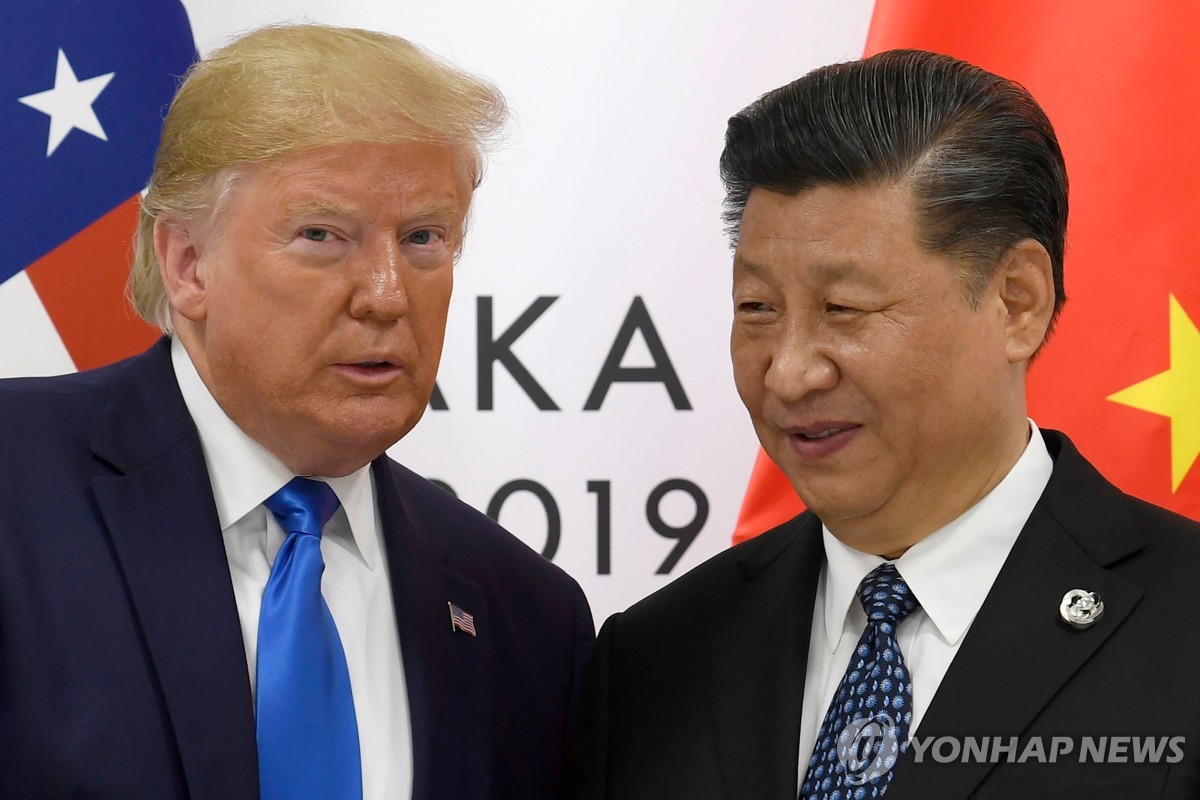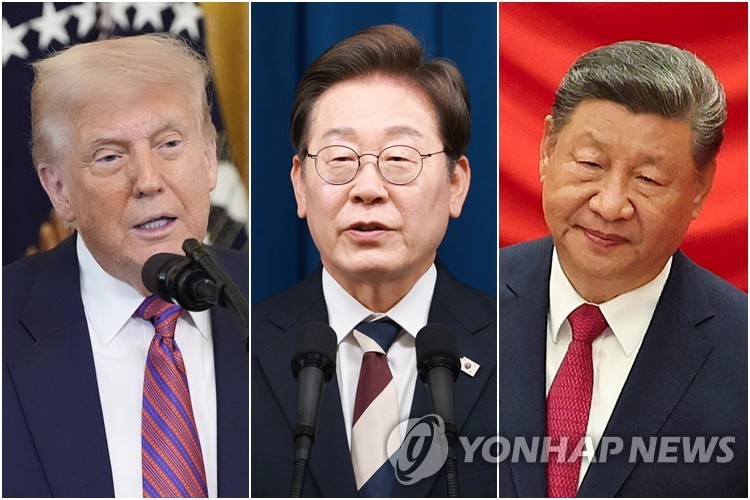Trump and Trump to meet in Busan on the 30th… Possibility of agreement to refrain from wide-ranging war on rare earths, tariffs, etc.
The first meeting with President Lee will take place on the 1st of next month… Discussions are expected to include improving South Korea-China relations, the North Korean nuclear program, and the THAAD sanctions.
(Beijing·Gyeongju=Yonhap News) Special Reporting Team = Chinese President Xi Jinping's visit to Korea, his first in 11 years, will be a hectic 2 nights and 3 days, including the US-China summit with President Donald Trump, which will be a watershed moment in the 'tariff war', the Asia-Pacific Economic Cooperation (APEC) summit in Gyeongju, and the Korea-China summit with President Lee Jae-myung.

Will the US-China Busan Summit Become the"Trade Talk of the Century" Regarding the Trade War?
Chairman Xi, who will arrive at Gimhae International Airport on the 30th, will hold a summit with President Trump in Busan as his first stop on his visit to Korea.
The two leaders' meeting marks their first in six years and four months since the G20 summit in Japan in June 2019.
This is also the first time the two leaders have met since the Trump administration took office in early this year and the two countries began exchanging high tariffs and trade restrictions in April.
The conflict between the two countries once reached the point of a trade severance with both sides imposing tariffs exceeding 100%, but a temporary truce has continued with a series of high-level talks held until this month.
Meanwhile, China has recently taken out the rare earth export control card, and the United States has responded with an additional 100% tariff, threatening that the two countries could start an all-out war again at any time.
However, as the US and Chinese trade representatives basically agreed on a"plan to address each other's concerns" during the negotiations in Malaysia on the 25th and 26th, where they reviewed the agenda for the summit, there is speculation that the two leaders are more likely to come up with an agreement on"restraint on escalation" at the Busan summit.
It has already been mentioned by US Treasury Secretary Scott Besant and others that China will suspend export controls on rare earth elements and the US will postpone imposing additional tariffs on China of 100% that were scheduled to take effect on the 1st of next month.
Here, the two countries are reportedly considering a plan to exchange a 10 percentage point reduction in the US's 'fentanyl tariffs on China' for China's resumption of imports of US soybeans, and reductions in mutually imposed ship entry fees and the easing of US software export controls are also being considered as possible agenda items for discussion.
The 'board' of trade negotiations can be expanded through talks between the two people who hold the final decision-making power.
On the other hand, there are observations that security issues such as the Taiwan Strait and the South China Sea, which are other points of contention between the two countries, may be somewhat sidelined from the core agenda for the time being.
On the 29th, President Trump said on his plane from Japan to South Korea,"I don't know if we'll even discuss Taiwan. I'm not sure if he (Chairman Xi) even wants to ask about it. Taiwan is Taiwan," adding,"But honestly, the beautiful thing about Taiwan is that we're attracting a lot of semiconductor manufacturers to the United States."
Of course, rather than leading to the"dialogue of the century" that will reestablish the long-conflicted US-China relationship and fundamentally resolve the sharp conflicts of interest, it is possible that this meeting will end up being a"temporary compromise" that only temporarily addresses the urgent conflicting factors, or that negotiations may even break down altogether.
There are also expectations that a major US-China summit could be postponed until then, as President Trump has announced plans to visit China early next year at the invitation of President Xi.

◇ South Korea and China: A different story from 11 years ago… Xi Jinping likely to send a message of cooperation with a positive gesture.
When President Xi Jinping visited South Korea in July 2014 during the Park Geun-hye administration, South Korea-China relations were so close that an expression that seems unfamiliar now was used: “both politics and economy are hot.”
Now, 11 years later, the relationship between Korea and China is in a difficult state.
South Korea-China relations froze as China reacted sensitively to the strengthening of South Korea-US-Japan cooperation during former President Yoon Seok-yeol's term and former President Yoon's remarks on the Taiwan Strait and the South China Sea.
The economic relationship between South Korea and China has changed from a 'mutually complementary' to a 'competitive' relationship, and amid the deepening US-China conflict, the 'US-ROK-Japan vs. North Korea-China-Russia' structure, and China's aggressive foreign policy, South Korea is structurally in a situation where it is difficult to easily choose the previous 'Anmi-gyeongjung' (security for the US, economy for China) line.
However, both South Korea and China agree that the two countries, which are geographically close, economically entrenched, and parties to the Korean Peninsula issue, cannot yet abandon each other.
Accordingly, there are expectations in the Chinese government and public that the summit between President Lee and Chairman Xi, who have advocated for"pragmatic diplomacy," to be held on the 1st of next month could be a new opportunity to inject vitality into South Korea-China relations.
In terms of agenda, there is speculation that the Chinese president will likely send a message to emphasize cooperation between South Korea and China, considering that South Korea is also facing trade pressure from the United States.
In particular, the acceleration of the second phase of negotiations for the Korea-China Free Trade Agreement (FTA), which is celebrating its 10th anniversary of its official entry into force, the expansion of the reciprocal visa-free policy, the expansion of cultural and scientific and technological exchanges, as well as the stabilization of supply chains and the protection of multilateral trade, which China has recently emphasized, can be discussed.
There are predictions that economic issues such as China's export controls on strategic minerals such as rare earth elements, which are of interest to South Korea, and obstacles to corporate management, as well as the issue of North Korea declaring itself a"nuclear state," will also be brought up for discussion.
As the Chinese leader has expressed his position that there should be no obstacles to cultural exchange between the two countries, there are predictions that he may show a forward-looking attitude on the issue of the THAAD ban (Korean Wave restrictions) that has continued since the THAAD (Terminal High Altitude Area Defense) incident in 2016.
Meanwhile, the issue of nuclear-powered submarines, which President Lee Jae-myung raised at the South Korea-U.S. summit held prior to the South Korea-China summit, could potentially become a last-minute variable.
In a meeting with President Trump on the 29th, the president stated that"diesel submarines have limited diving capabilities, so their tracking activities against North Korean or Chinese submarines are limited," and expressed his position that the South Korean military should build nuclear-powered submarines equipped with conventional weapons to conduct defensive activities.
Some observers say that China's mention of strategic weapons aimed at China in South Korea, where it has hosted Chinese President Xi Jinping as a state guest, could be seen as a diplomatic faux pas.
![[그래픽] 미·중 정상 국빈 방한 주요 일정](https://img7.yna.co.kr/etc/graphic/YH/2025/10/29/GYH2025102900050004400_P4.jpg)
◇ Continued US containment expected on multilateral stages… Interest also growing in whether a China-Japan summit will take place amidst strained relations.
During this APEC summit, a"super week of summit diplomacy," Chairman Xi is expected to reiterate his recent stance of upholding the multilateral and free trade international order and expanding the rights and voice of developing countries through his speeches and meetings with leaders of various countries.
All of these messages are intended to indirectly criticize President Trump, who has championed"America First," and increase their country's international influence.
China is also openly asserting that the world in which the United States monopolized hegemony is over, as seen in Foreign Minister Wang Yi's remarks at a forum attended by ambassadors from various countries on the 27th, saying that"a multipolar world is coming."
Meanwhile, attention is focused on whether the city mayor will hold a bilateral meeting with new Japanese Prime Minister Sanae Takaichi during the APEC period.
Unlike the past practice of President Xi Jinping personally sending congratulatory messages when a Japanese prime minister takes office, China sent only a congratulatory message in the name of Premier Li Qiang this time, and directly criticized Prime Minister Takaichi through state-run media for visiting the Yasukuni Shrine and denying the Nanjing Massacre.
As if to show this 'uncomfortable' atmosphere, while the schedules for summits between major countries such as South Korea-US, US-China, South Korea-China, and South Korea-Japan are being set one after another in the wake of the Gyeongju APEC Summit, news of the China-Japan summit has not been made official.
However, there was speculation that the king left open the possibility of holding a summit meeting as he emphasized the importance of high-level exchanges during a phone call with the Chinese and Japanese foreign ministers on the 28th.
Kyodo News also reported on the 29th, citing sources, that China and Japan are coordinating the schedule for the summit on the 31st.
However, in a briefing that day, when asked,"Does China want to hold the first summit between the leaders of Japan and China in South Korea?", the Chinese Foreign Ministry responded,"We currently have no information to provide regarding that summit."

